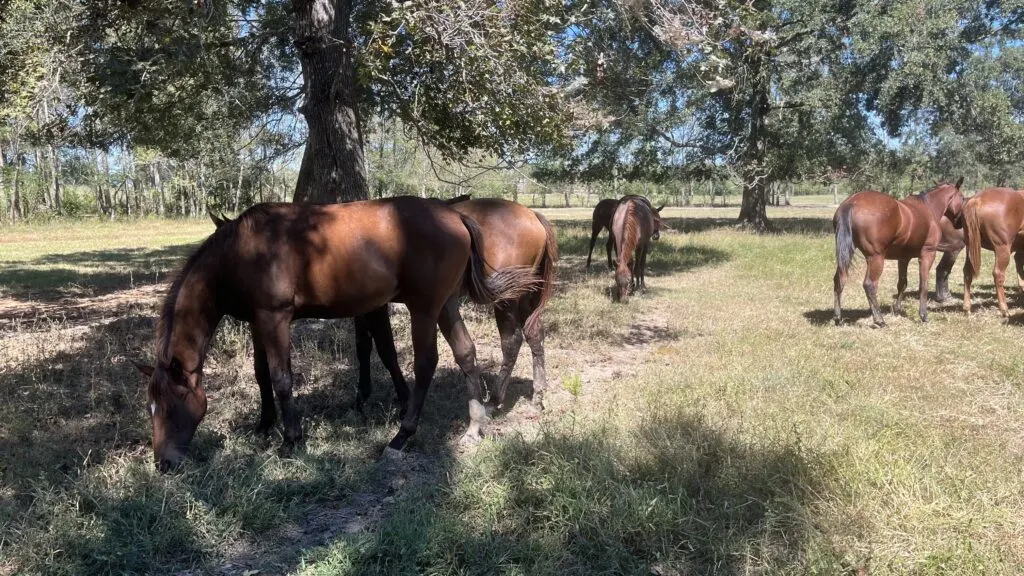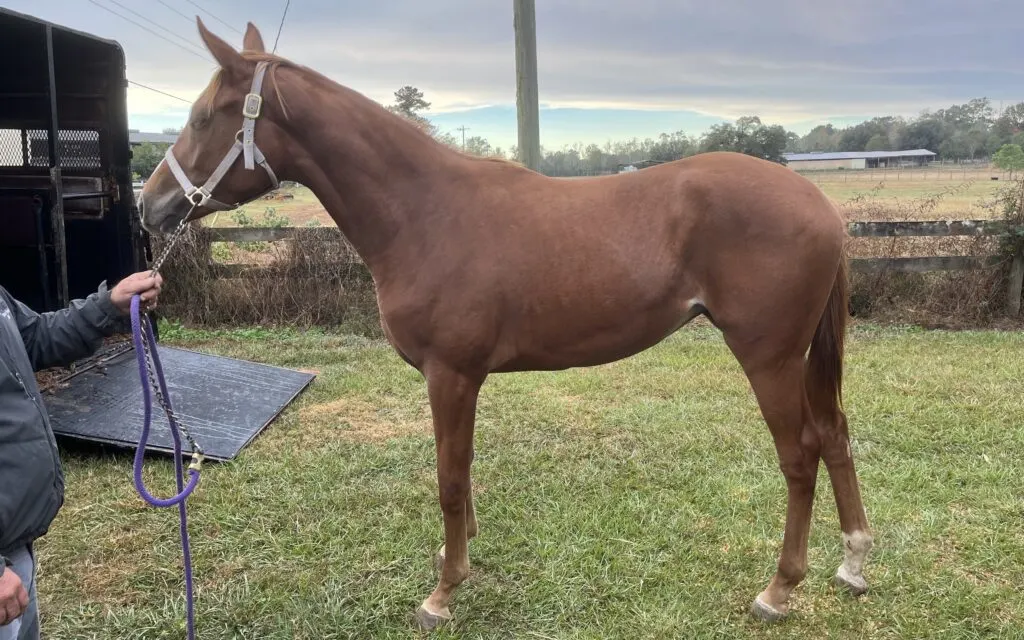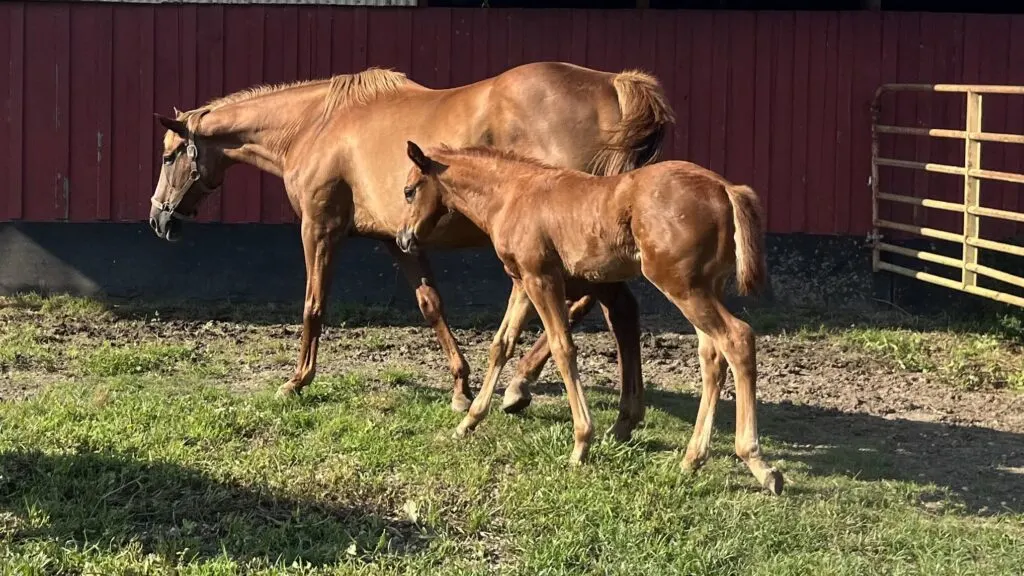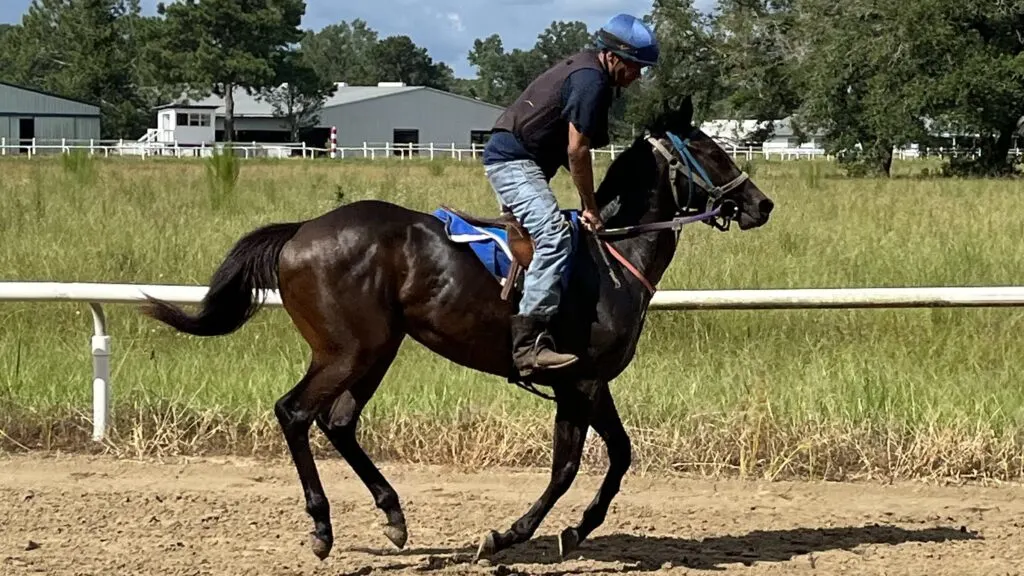Last updated: December 31, 2023
Have you ever wondered what it costs to own a racehorse? As a longtime racehorse owner with experience in purchasing from private sellers, auctions, and even raising my own horses, I’ve navigated the complex world of equine finance firsthand.
When I bought my first racehorse, it was the beginning of a journey filled with both challenges and rewards. The thrill of ownership comes with a series of ongoing expenses that many new owners may not anticipate. From training and veterinary care to boarding and insurance, the costs can add up quickly.
In this article, I’ll break down the real costs of owning a racehorse. Drawing from my personal experiences, I will provide a clear and concise overview of what you can expect to spend. Whether you’re a first-time buyer or looking to expand your stable, understanding these costs is essential for making informed decisions in the world of racehorse ownership.

Understanding Racehorse Costs
Buying a racehorse brings with it a spectrum of financial considerations. In this section, we’ll explore the various factors that influence the initial purchase price and the ongoing expenses, providing a clear picture of what it truly costs to own a racehorse.
Initial Purchase Price
When considering the purchase of a Thoroughbred racehorse, it’s essential to understand the factors that influence their price. The average price range for a Thoroughbred is generally estimated to be between $50,000 and $300,000. This range, however, is a broad generalization and can vary significantly based on several key factors.
Key Factors Influencing Price:
- Pedigree: A racehorse prospect yearling with a strong pedigree often commands a higher price. A well-documented lineage of successful racers increases the potential for success, making these horses more sought after.
- Age: The age of the horse plays a crucial role. Younger horses, especially yearlings, are priced for their potential in racing careers.
- Training Level: The extent of training a horse has undergone can impact its price. A horse that is race-ready or has shown promise in training can fetch a higher price.
- Racing Potential: The perceived potential of a horse to succeed in racing based on its physical attributes, health, and temperament is a significant price determinant.
It’s important to note that the actual price of Thoroughbred racehorses varies widely. On the lower end of the spectrum, prices might be seen for horses in less competitive markets or those with lesser pedigrees. Conversely, horses with exceptional lineage or proven track records can command prices at the higher end of the range.
For prospective buyers, it’s crucial to seek accurate and current pricing information. This can be obtained through:
- Horse Auctions: Recent sales data from auctions can provide real-time market prices.
- Racing Industry Reports: These reports offer insights into pricing trends and factors influencing the market. The Jockey Club provides information on trends in AUCTION SALES IN NORTH AMERICA.
- Professional Assessments: Consultations with breeders and trainers can offer expert evaluations based on a horse’s specific characteristics and potential.
While the average price range offers a starting point, thorough research and professional advice are key to understanding the true value of a Thoroughbred racehorse. This approach ensures that you can make informed decisions aligned with your goal and budget in the exciting world of racehorse ownership.
Ongoing Maintenance Costs
Owning a racehorse involves various ongoing costs:
- Training: The largest expense, averaging $2,000 – $3,500 per month. This includes the trainer’s fees, track use, and routine exercise regimens.
- Veterinary Care: Regular check-ups, vaccinations, and any needed treatments can range from $500 to $2,000 monthly, depending on the horse’s health and racing intensity.
- Boarding: Costs for stabling a horse can vary widely, typically between $500 and $1,500 per month, based on the facility’s quality and location.
- Insurance: To cover accidents, illness, or even mortality, insurance costs can be around 3-5% of the horse’s value annually.
- Farrier: Racehorses need shoeing regularly.

Real-World Example:
Cost Breakdown for a Thoroughbred, 3-year-old with a good pedigree
- Initial Cost: $250,000
- Monthly Training (including boarding): $3,000
- This covers the trainer’s fees, use of track facilities, routine exercise, and basic boarding needs.
- Veterinary Care: $500 – $1,000 per month
- Regular health check-ups, vaccinations, and any special treatments.
- Chiropractic Care: Approximately $100 – $200 per month
- Regular chiropractic sessions to ensure the horse’s optimal physical condition are especially important for racehorses.
- Shoeing Costs: Around $120 – $250 per month
- This includes regular farrier visits for shoeing and hoof care, which are crucial for a racehorse’s performance and health.
- Insurance: Approximately 3-5% of the horse’s value annually
- For a horse valued at $250,000, this would be around $7,500 – $12,500 per year, depending on the coverage.
This detailed breakdown offers a transparent view of the financial realities of racehorse ownership. It should help you, as a potential owner, understand the comprehensive nature of the investment involved.
Owning a racehorse is not just a passion, but also a significant financial commitment, and this overview aims to prepare you for the journey ahead. Keep in mind these costs can fluctuate based on individual circumstances, the specific needs of your horse, and the standard of care you choose to provide.
Hidden and Unexpected Costs
Owning a racehorse involves several costs that might not be immediately apparent. Being aware of these can help in better financial planning and management.
- Transportation: Moving horses to different tracks or training facilities can be costly. Depending on the distance and logistics, transportation fees can vary significantly.
- Emergency Care: Unexpected medical emergencies, such as colic surgery, can incur substantial expenses. It’s crucial to have a contingency fund for such unforeseen events.
- Race Entry Fees: While some races have nominal entry fees, others, especially high-stakes races, can have entry fees running into thousands of dollars.
- Downtime Costs: Periods when the horse is not racing but still incurs costs for upkeep, training, and care, especially during recovery from injuries or illnesses.
For example, I had a horse in training that collicked and was rushed to surgery; his medical expenses dramatically altered his vet bills for the year. Entering the world of racehorse ownership is a thrilling venture, and being well-informed about these expenses is key to enjoying this unique and rewarding experience.

Acquiring a Racehorse: Methods and Considerations
Every method of acquiring a racehorse comes with its own set of challenges and opportunities. Whether it’s negotiating with private sellers, navigating the electric atmosphere of auctions, or strategically selecting horses in claiming races, informed decision-making and thorough research are paramount.
Private Sellers: Uncovering Hidden Gems
When it comes to purchasing racehorses, private sellers can often provide unexpected value. My experience has shown that direct dealings with owners can lead to advantageous deals.
For instance, I’ve encountered breeders who, due to various reasons like financial hardships or downsizing, were willing to sell high-potential yearlings at prices well below market value. These scenarios, while requiring careful evaluation of the horse’s pedigree and health, can be golden opportunities for astute buyers.
Auctions: The Thrill and Strategy
Auctions are a dynamic and exciting way to purchase racehorses, but they require a strategic approach. I recall my experience at a yearling auction where I got caught in a bidding war, driven by the excitement of the moment, and ended up paying more than intended.
It’s a common scenario at prestigious events like the Keeneland September Yearling Sale, known for showcasing top-tier yearlings. Here, buyers from around the globe converge, and prices can soar. My advice is to thoroughly review the catalog, set a budget, and stick to it, no matter how tempting the auction atmosphere becomes.
Claiming Races: A Calculated Risk
Claiming races offer a unique avenue for acquiring racehorses already in competition. In these events, each horse entered is available for purchase at a specified price. However, this method requires astute judgment. I’ve seen instances where owners placed horses with underlying health issues into claiming races, hoping to pass them off to unwary buyers.
Therefore, it’s crucial to conduct thorough research on the horse’s history, consult with trainers, and possibly seek veterinary advice before making a claim. This due diligence is key to ensuring that you’re investing in a horse with potential rather than inheriting someone else’s problem.
Joining a Syndicate: An Accessible Path to Ownership
For many, the dream of racehorse ownership might seem out of reach due to the significant financial commitment it entails. However, joining a syndicate offers a more accessible path into this exciting world.
What is a Syndicate?
- A syndicate is a group of individuals who collectively own a racehorse. Instead of bearing the entire cost of purchasing and maintaining a horse, costs are shared among the members.
Benefits of Joining a Syndicate:
- Reduced Financial Burden: You can own a share of a racehorse, as little as 5%, significantly lowering the initial and ongoing costs.
- Shared Responsibilities: The syndicate manages the horse, meaning you enjoy the benefits of ownership without the complexities of day-to-day management.
- Community and Networking: Being part of a syndicate allows you to connect with like-minded individuals, sharing experiences and knowledge.
Considerations:
- While joining a syndicate reduces individual costs, it’s important to choose the right group. Consider the syndicate’s reputation, management style, and the specific terms of the agreement.
Joining a syndicate can be an excellent way to experience the thrill of racehorse ownership without the full financial and time commitments. It opens the door to many who wish to be part of this exhilarating world but are looking for a more manageable entry point.

Practical Tips for Prospective Owners
Successful racehorse ownership hinges on effective networking, rigorous due diligence, and managing the emotional aspects of purchasing. These practical tips, drawn from personal experiences, are designed to guide prospective owners through the complex yet rewarding journey of acquiring a racehorse.
Networking in the Industry
In the world of racehorse ownership, who you know can be just as important as what you know. Building a network within the racing community is invaluable. Attending races, visiting training facilities, and engaging in industry events are excellent ways to make connections.
Letting people know you’re interested in purchasing a racehorse opens doors to opportunities that might not be publicly advertised. Networking can lead to first-hand information about horses for sale and insider tips on the best deals.
The Importance of Due Diligence
When acquiring a racehorse, especially from private sellers or through claiming races, due diligence is crucial. This involves more than just assessing the horse’s physical condition; it’s about understanding its history, performance, and potential health issues.
Thorough vet checks are non-negotiable. They can reveal underlying problems that might not be immediately apparent. In my experience, investing time and resources in comprehensive vet examinations has been essential in making informed decisions and avoiding costly mistakes.
Emotional Aspects of Purchasing
Purchasing a racehorse can be an emotionally charged experience. It’s easy to get swept up in the excitement, particularly at auctions. I recall an instance where I became emotionally invested in a yearling I watched grow up. My attachment to her led to paying beyond my intended budget.
This experience taught me the importance of setting a budget and sticking to it, regardless of my emotions. It’s crucial to balance passion with pragmatism to make decisions that are financially sound and aligned with your goals in the sport.

Cost Comparison and Market Analysis
In my quest to understand the full spectrum of racehorse ownership costs, I’ve encountered a range of figures in various publications. To bring clarity and context, I’ve compared these numbers with my own findings. This section aims to offer a detailed perspective on how different factors contribute to the pricing dynamics in the racehorse market.
Table: Comparative Cost Analysis
| Factor | My Data | Publication 1 | Publication 2 | Publication 3 |
|---|---|---|---|---|
| Initial Purchase | $250,000 | $200,000 | $300,000 | $150,000 |
| Monthly Training | $3,000 | $2,500 | $3,500 | $2,800 |
| Veterinary Care | $600 – $1,200 | $500 – $1,000 | $700 – $1,300 | $650 – $1,100 |
| Chiropractic Care | $150 | $100 | $200 | $120 |
| Shoeing Costs | $185 | $160 | $210 | $170 |
| Insurance | $10,000/year | $8,000/year | $12,000/year | $9,500/year |
Insights or Discrepancies:
- My data shows a higher initial purchase price, possibly reflecting a focus on premium breeds or pedigrees.
- Monthly training costs are comparable across the board, but slight variations could indicate differences in training facilities or methods.
- Veterinary and chiropractic care costs show minor discrepancies, suggesting variations in healthcare approaches or regional cost differences.
Trends and Market Fluctuations
Racehorse costs are not static; they fluctuate based on several market conditions:
- Economic Factors: Broader economic trends can significantly impact the racehorse market. In times of economic prosperity, there’s often an increase in discretionary spending, which can drive up prices.
- Racing Industry Trends: Changes in racing popularity, major racing events, and industry regulations can affect costs. For example, increased demand for racehorses during high-profile racing seasons can lead to higher prices.
- Breeding Trends: Shifts in breeding practices, such as the emergence of new successful sires or breeding techniques, can influence the market value of certain breeds or lineages.
- Global Events: Factors like pandemics or international trade policies can impact the racehorse market, affecting everything from purchase prices to the cost of care.
Regular Updates: I intend to regularly update this information to reflect the latest trends and market conditions, ensuring you have access to the most current and relevant information.

Expert Insights and Testimonials
In this subsection, I share some insights from various industry experts, including trainers, breeders, and veterinarians, offering their perspectives on racehorse ownership.
Trainer’s Perspective:
- Trainer Richard Mandella, Racehorse Trainer:
- “Looking for a perfect horse may be an ideal goal, but there are no perfect horses, and I’ve seen some near-perfect ones that couldn’t run and some incorrect horses that could run like hell.”
Auction Sale’s Insight:
- Geoffrey Russell, Director of Sales, Keeneland:
- “We need to educate buyers and promote a better and more pragmatic relationship with veterinarians. I would like to see buyers gaining more information and knowledge from their veterinarians and developing a greater comfort level with their veterinarians.”
Veterinarian’s Advice:
- Dr. Scott Pierce, Rood & Riddle Equine Hospital
- “It is up to the client to become educated (about throats and other central issues regarding horses). People want to buy the horses that make their short lists, and it’s our job not to get in the way unless the yearling has a significant problem.”
Owner Testimonials
Here, we share experiences and stories from various racehorse owners, highlighting the joys and challenges of ownership.
First-Time Owner Experience:
- Cliff McNeil:
- “As a new owner, the learning curve was steep. The thrill of my horse’s first race was unmatched, but it was the community and the shared experiences with other owners that were truly invaluable.”
Long-Time Owner Journey:
- Kristie Thomas:
- “Over the years, I’ve seen highs and lows. The key is patience and resilience. One of my horses took two years to reach the starting gate then got hurt in his first outing. He came back and won his second race after a six month layoff. It’s a long-term commitment.”
Owner with Multiple Horses:
- William Bradley:
- “Owning multiple horses means diversifying your experiences but also your expenses. Each horse is unique, and their needs can vary greatly. It’s a balancing act of passion and practicality.”
These testimonials and expert insights provide a well-rounded view of racehorse ownership, offering valuable lessons and advice for potential and current owners alike.

Investment Analysis
Racehorse ownership as an investment requires a realistic approach to potential returns and profitability.
- Initial Investment vs. Ongoing Costs: The initial purchase price is just the beginning. Ongoing costs can sometimes exceed the initial investment over time, depending on the horse’s career length and success.
- Prize Money and Earnings: While prize money from winning races can be substantial, it’s important to note that only a small percentage of racehorses achieve significant winnings.
- Breeding Potential: For some horses, especially those with a successful racing career or desirable pedigree, breeding can offer another avenue for return on investment.
- Resale Value: The resale value of a racehorse can vary greatly. Factors like age, health, and racing record play a significant role in determining its value at the end of its racing career.
FAQ Section
What was the most expensive horse ever sold?
Fusaichi Pegasus sold for nearly seventy million dollars.
How can you get the best price on a racehorse?
Consider private sellers for potential bargains, be cautious at auctions, and explore claiming races with due diligence.
Is owning a racehorse profitable?
Owning a racehorse can be profitable, but it’s not guaranteed. Success depends on various factors like the horse’s performance, training, health, and market conditions. Most owners view it as a passion-driven endeavor rather than a certain financial investment, with the potential for both high rewards and risks.
Conclusion: Buying a Racehorse
In this comprehensive guide, we’ve explored the multifaceted world of racehorse ownership, covering everything from initial purchase prices and ongoing maintenance costs to the less obvious expenses and the realities of investment analysis. The journey of owning a racehorse is both exhilarating and demanding, requiring a deep understanding of the financial commitment involved.
Remember, owning a racehorse goes beyond mere financial implications; it’s a journey filled with passion, excitement, and sometimes, unexpected challenges. Whether you’re a first-time buyer or an experienced owner looking to expand your stable, being well-informed is key to navigating this unique endeavor successfully.
Stay Connected and Informed:
- If you found this guide helpful, consider signing up for our newsletter for more insights and updates on racehorse ownership.
- For personalized advice or specific inquiries, feel free to contact me directly. I’m here to help guide you through your racehorse ownership journey.
Connect with Me
- Email: [email protected]
- Social Media: Follow me on Facebook for daily updates, tips, and insights into the world of horses.
- Website: Visit my website horseracingsense.com, for more articles, resources, and information about my work.
Join the Conversation:
- I encourage you to share your thoughts, experiences, or questions in the comments section below. Let’s create a community of informed and passionate racehorse owners.
- Don’t forget to share this article with your network. Use the social share buttons to spread the knowledge and love for racehorse ownership.
Thank you for reading, and I look forward to connecting with you, whether it’s through our newsletter, direct communication, or in the comments section. Here’s to the thrilling journey of racehorse ownership!
